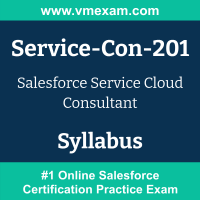 The Salesforce Service-Con-201 exam preparation guide is designed to provide candidates with necessary information about the Service Cloud Consultant exam. It includes exam summary, sample questions, practice test, objectives and ways to interpret the exam objectives to enable candidates to assess the types of questions-answers that may be asked during the Salesforce Certified Service Cloud Consultant exam.
The Salesforce Service-Con-201 exam preparation guide is designed to provide candidates with necessary information about the Service Cloud Consultant exam. It includes exam summary, sample questions, practice test, objectives and ways to interpret the exam objectives to enable candidates to assess the types of questions-answers that may be asked during the Salesforce Certified Service Cloud Consultant exam.
It is recommended for all the candidates to refer the Service-Con-201 objectives and sample questions provided in this preparation guide. The Salesforce Service Cloud Consultant certification is mainly targeted to the candidates who want to build their career in Salesforce Consultant domain and demonstrate their expertise. We suggest you to use practice exam listed in this cert guide to get used to with exam environment and identify the knowledge areas where you need more work prior to taking the actual Salesforce Service Cloud Consultant exam.
Salesforce Service-Con-201 Exam Summary:
| Exam Name | Salesforce Service Cloud Consultant |
| Exam Code | Service-Con-201 |
| Exam Price |
Registration fee: USD 200 Retake fee: USD 100 |
| Duration | 105 minutes |
| Number of Questions | 65 |
| Passing Score | 78% |
| Recommended Training / Books |
Prepare for Your Salesforce Service Cloud Consultant Credential Administer and Maintain Service Cloud (ADX261) Administer Intelligent Service Cloud Solutions (ADX361) |
| Schedule Exam |
Kryterion Webassessor PEARSON VUE |
| Sample Questions | Salesforce Service-Con-201 Sample Questions |
| Recommended Practice | Salesforce Certified Service Cloud Consultant Practice Test |
Salesforce Service Cloud Consultant Syllabus:
| Section | Objectives | Weight |
|---|---|---|
| Industry Knowledge |
- Explain the factors that influence key Contact Center metrics and key performance indicators (KPIs). - Determine the risks, benefits, and business challenges of meeting a client's desired outcome. |
12% |
| Implementation Strategies |
- Given a scenario, determine how to participate in a successful consulting engagement. - Given a scenario, recommend appropriate Service Cloud deployment and training strategies. - Explain the considerations and implications for data migration, data quality, data governance, and large data volumes. |
12% |
| Service Cloud Solution Design |
- Given a scenario, analyze customer requirements to determine an appropriate solution design considering capabilities, limitations, and design trade-offs for the service rep experience. - Given a scenario, analyze customer requirements to determine an appropriate solution design considering capabilities, limitations, and design trade-offs for the customer experience. - Given a set of customer data security and compliance requirements, determine a successful design to secure the data. |
15% |
| Knowledge Management |
- Explain the Knowledge article lifecycle, Knowledge Centered Service (KCS), and Salesforce Knowledge Management configuration. - Given a set of requirements, determine how to configure Knowledge to deliver service support and self-service processes. |
12% |
| Intake and Interaction Channels |
- Given business process requirements, recommend the appropriate approach to intake channels and their design. - Given a set of business goals, discuss the use cases and functionality for proposed interaction channels. - Assess the design considerations and best practices when configuring an interaction channel solution. - Given a set of business requirements, recommend an appropriate use for AI agents in the customer service process. - Explain agentic service capabilities, use cases, and configuration processes. |
13% |
| Case Management |
- Given a set of requirements or KPIs, design a case management solution from creation to closure. - Given a set of requirements, explain how case deflection strategies are delivered in Experience Cloud sites, Agentforce, and Knowledge. - Explain the capabilities, use cases, and how to configure service entitlements, milestones, assets, business hours, and service-level agreements (SLAs). - Differentiate the use cases and capabilities of Service Cloud automation. |
13% |
| Contact Center Analytics | - Given a scenario, develop reports and dashboards in Salesforce to provide relevant information to different stakeholders. | 13% |
| Integrations | - Explain the use cases and considerations for core Service Cloud integrations, including third-party solutions and connections to external sources of data. | 10% |
